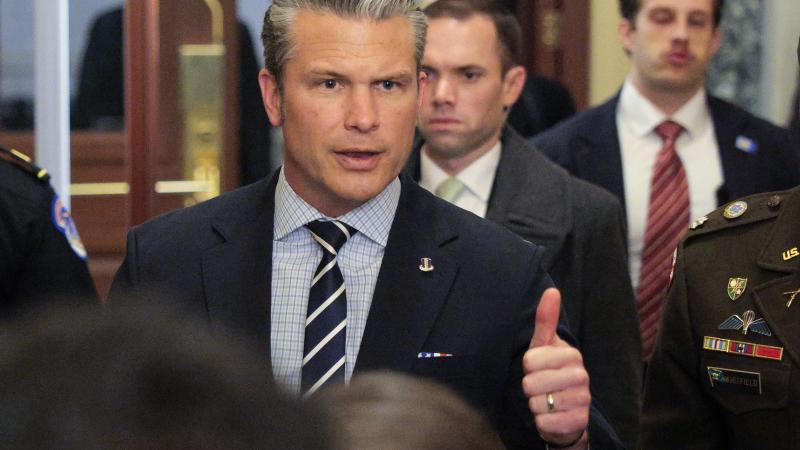Texas legislature to consider border resolution declaring state is under invasion
Legislation also calls on the federal government to declare Mexican cartels as Foreign Terrorist Organizations.
Texas state Sen. Lois Kolkhorst has filed three bills and one resolution to address the border crisis, including one that would declare Texas is under invasion by Mexican cartels.
Kolkhorst, R-Brenham, said one of the most common questions she receives from constituents is, “What is Texas doing to combat the absence of a secure border?”
“While the federal government is charged with border control, they have failed to keep Texas and the United States safe,” she said in a news release. “As a result, Texans are suffering, which is why I have filed legislation to address the horrific fentanyl crisis, enhance offenses for unauthorized immigrants who commit crimes, ensure Texas workers are legally authorized to work in the U.S., and declare to the federal government that Texas has been invaded by foreign drug cartels.”
SCR 23, a concurrent resolution, would declare that Texas, under Article I, Section 10 of the U.S. Constitution, “is entitled as a sovereign state of the United States of America to protect itself against this current foreign drug cartel invasion; this constitutional authority grants the State of Texas the power to defend the state when the state has been invaded, or is ‘in such imminent Danger as will not admit of delay.’”
It also calls on the federal government to declare Mexican cartels as Foreign Terrorist Organizations, something the Biden administration has said it will not do.
It also calls on the Texas Legislature to “find that the State of Texas has been invaded by foreign drug cartels and that the citizens of this state are in danger of irreparable harm” and to encourage “all applicable state and local resources as needed, to use any and all authority under Article I, Section 10 of the United States Constitution to repel this violent foreign drug cartel invasion, and that such authority should be invoked with the intention of utilizing such authority in the most peaceful manner possible consistent with bringing this invasion to a conclusion at the earliest possible moment.”
At least 42 Texas counties have declared an invasion or expressed support for Texas doing so, as well as the Republican Party of Texas and the Texas Public Policy Foundation.
Kolkhorst also filed SB 1620 to enhance state penalties for crimes committed by foreign nationals who illegally enter the U.S. The bill would amend the penal code related to the prosecution and punishment of certain criminal offenses committed “in the course of or for the purpose of unlawfully entering the United States, unlawfully bypassing certain law enforcement checkpoints, or evading an arrest or detention; increasing criminal penalties,” according to the bill language.
Another bill filed, SB 1621, would require local governments, state contractors, and private employers in Texas to participate in E-Verify, a federal system to ensure workers are legally authorized to work in the U.S. Texas state agencies have been required to use E-Verify since 2015.
It would require a greater number of entities to comply with E-Verify than a bill filed by state Rep. Matt Shaheen in January.
Currently, no state law requires private companies to comply with E-Verify. Special interests and Texas businesses that have lobbied against stronger employment verification laws, critics argue, do so because they may be exploiting migrants to profit off cheap labor and unintentionally or intentionally participating in forced labor and human trafficking. Kolkhorst’s bill would change this.
She also filed SB 1622, which would create a new offense in the state health and safety code, in line with a pledge made earlier this year by Gov. Greg Abbott: those who manufacture or deliver fentanyl that causes the death of an individual will be charged with murder.
Addressing the fentanyl crisis and border security is a legislative priority of the governor, who’s maintained that people unintentionally ingesting fentanyl and dying from it will be classified “for what it is … a poisoning.” And their death will be classified as a crime of murder.
“Anyone who laces a pill with fentanyl and knowingly sells it to someone else who loses their life should be arrested, tried and convicted for murder,” Abbott said last fall when meeting with sheriffs to discuss the fentanyl crisis and crime stemming from the border.
Under Kolkhorst’s bill, the new offense would be classified as a first degree felony and carry a sentence of life in prison or 5 to 99 years in a Texas state prison.
She said she filed the bills because crimes being committed by illegal foreign nationals and human and drug traffickers “will not stand.”
“Where the federal government is avoiding its responsibility, Texas will fulfill its constitutional duty to protect our citizens, property, and border,” she said.
















